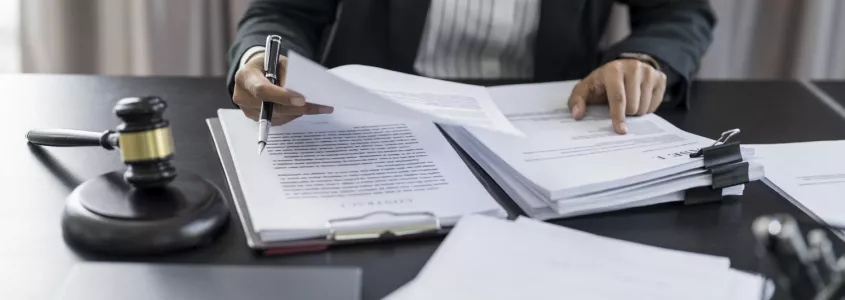
Table of contents
A legal incapacitation is a difficult issue but, at the same time, necessary on many occasions. Thanks to it, it is possible to grant the capacity to make important decisions to a close and trusted person of another person who cannot make use of it for whatever reason. Here we will try to explain everything you need to know about this process.
What exactly is legal incapacity?
The first thing to discern is what exactly is the legal or civil incapacity of a person. Specifically, this term refers to a legal situation whereby a certain subject does not have the capacity to govern either their property or their own person due to their mental, physical or sensory situation, which makes it essential that another person, either through the figure of a curator, guardian or legal defender, looks after their situation, their rights and their obligations.
Physical disability and legal incapacity should never be confused as they are not necessarily related to each other. Disability is a purely administrative situation and does not necessarily entail incapacity. Likewise, this incapacity is understood as a civil status that must be acquired by means of a final judgement.
Any person, whether family member or spouse, can be the representative of a disabled person and exercise his or her rights under the regime of curatorship, guardianship or Legal Defender, according to the judge's decision. However, this power excludes acts judicially considered as very personal. A good example of this would be the granting of a will, in which case no one can represent the incapacitated person.
Characteristics of the incapacitation process
This process is contentious, jurisdictional and adversarial in nature and is informed by the principles of legality, officialdom and disposition. Furthermore, it is governed by the provisions of article 200 of the Civil Code, which speaks of 'persistent deficiencies or illnesses of a mental or physical nature that prevent a subject from governing himself/herself'. The court sentence will determine the limits of the incapacity and will specify the regime of guardianship or tutorship of the incapacitated person. This is not applicable to minors as they are under the regime of parental authority until they reach the age of 18.
For its part, Article 199 of the Civil Code offers a series of guarantees during the process of determining permanent or reversible incapacity. In this sense, it requires that there must be a judicial decision in the form of a final judgement issued by a competent judge. Likewise, the causes that give rise to it must be included in articles 200 and 201 of the Civil Code.
On the other hand, the incapacitation process can only be initiated by certain parties. These, except in one case, may be the guardians responsible for the incapacitated person in the future, in accordance with Article 757 of the Civil Procedure Act:
1. The affected person him/herself. The process can be started at the initiative of the person who claims to have the incapacity.
2. Relatives. The siblings, ascendants and descendants of the incapacitated person.
3. Spouses. Whether they are married or living together in a similar situation.
4. Those responsible for guardianship or parental authority. Those who have exercised these responsibilities when the incapacitated person was a minor..
Nor should it be forgotten that, according to Article 399.1 of the Civil Procedure Act, this civil incapacitation process must be initiated by the filing of an application in which the petition for incapacitation and the reason for it must appear. This does not preclude the court from issuing it for a reason other than that specified by the plaintiff.
Legal incapacity, guardianship and will: Who can be the beneficiaries?
The protected patrimony of persons with disabilities is regulated in Chapter I of Law 41/2003 and specifies that it will be the disabled themselves who will be the beneficiaries of it. In this sense, this regulation specifies that they must have a physical or sensory disability of more than 65% and/or a mental disability of more than 33%.
This patrimony, which enjoys special protection according to the specified legislation, is directly linked to the disabled person's own needs with the aim of covering and satisfying them. Therefore, the rights and assets that comprise it have no legal personality of their own and must be isolated from the rest of the owner-beneficiary's assets and be subject to a very specific regime of supervision and administration.
The court sentence may also specify the internment of the affected person provided that there is a risk to his or her health or that of those around him or her for reasons closely linked to his or her mental incapacity or because non-admission could lead to a deterioration of his or her health.
Guardianship, on the other hand, must be exercised by one person only, with a few exceptions, which are the following:
1. That the guardianship of the incapacitated person is jointly exercised by the mother and the father in a manner similar to parental authority.
2. If guardianship is given to a sibling and it is considered appropriate that his or her spouse should also exercise guardianship.
3. If the parents of the incapacitated person appoint more than one guardian by notarial deed, provided that they are able to exercise the guardianship jointly.
The figure of self-custodian also deserves a special mention as it refers to the possibility of a person with a degenerative illness being able to act in relation to his or her future incapacitation when he or she is still in possession of his or her mental and physical faculties.
Is reintegration of civil capacity possible?
In matters of judicial incapacity, guardianship and wills, the legislation of our country contemplates this possibility. Specifically, this appears in Article 761.1 of the Civil Procedure Act, which states that, in the future, with the appearance of new circumstances and conditioning factors, it will be possible to modify the scope of the incapacitation or even to render it null and void.
In fact, the court, when issuing the sentence of permanent incapacity, may determine the need to carry out periodic review processes in case the affected person's capacity is reintegrated. If this were to occur, it would lead to the disappearance of the guardianship or, failing that, to its substitution by the curatorship, depending on the case.
The initiation of this process of reintegration of capacity corresponds to the spouse of the incapacitated person, his or her ascendants, descendants or siblings, the Public Prosecutor's Office, the person exercising guardianship and the incapacitated person himself or herself. This is so except in the case of minors, in which case it should be those who have parental authority.
However, given the importance of the fundamental rights at stake in initiating this process, the doctrine emphasises that, preferably, it should be the judge who initiates it. Moreover, it is not a mechanism whose purpose is to correct possible deficiencies that may have occurred during the incapacitation, but an entirely new process.
This is the most important thing you should know about the issue of legal incapacitation. Of course, there are many other details surrounding this process, so we invite you to contact us if you have any further questions.

"Anywhere in Spain"
With our online appointment system you will have immediate advice without the need for face-to-face visits or travel.
One of our lawyers specialized in your area of interest will contact you to formalize an appointment and make your consultation by video call.

Add new comment